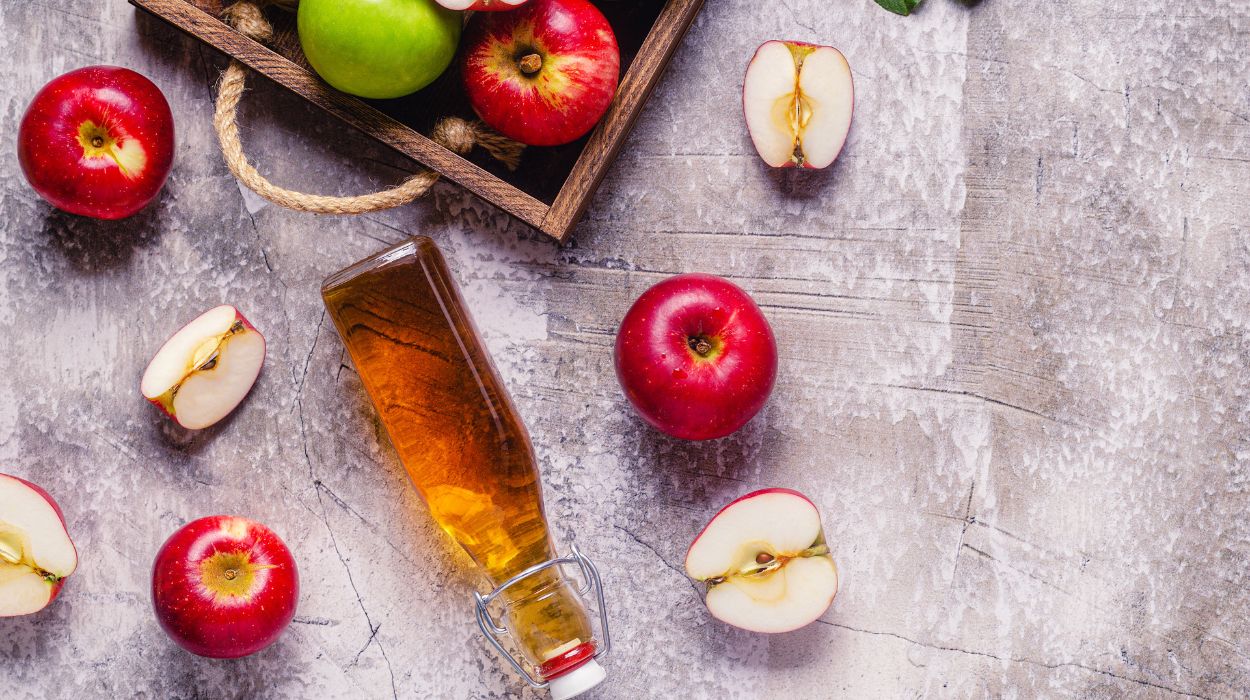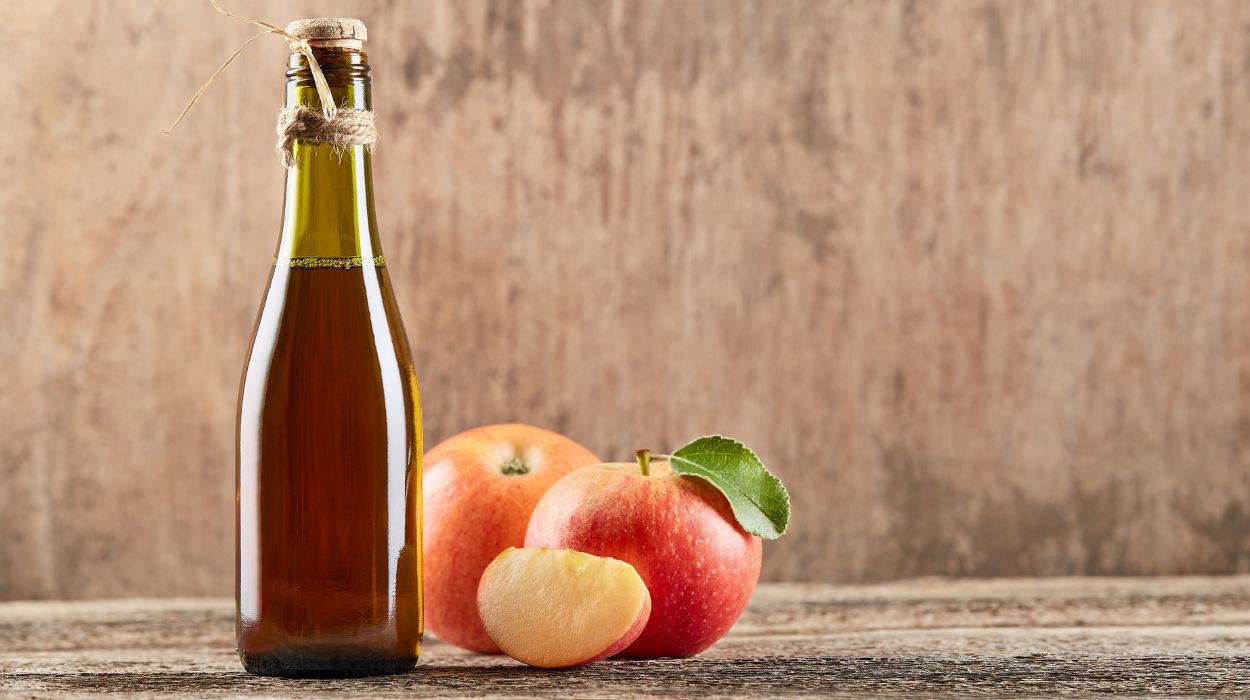 Evidence Based
Evidence Based
Evidence Based
This article is objectively based on relevant scientific literature, written by experienced medical writers, and fact-checked by a team of degreed medical experts.
Our team of registered dietitian nutritionists and licensed medical professionals seek to remain objective and unbiased while preserving the integrity of any scientific debate.
The articles contain evidence-based references from approved scientific sites. The numbers* in parentheses (*1,2,3) will take you to clickable links to our reputable sources.
Apple Cider Vinegar Detox: Does It Really Work For Your Health 2024?

People are now utilizing a variety of goods to improve their overall health. Hair growth products, protein supplements, body-building supplements, and apple cider vinegar are all examples of methods that you can use to reach a specific goal.
This article will discuss the benefits of apple cider detoxification, its potential adverse effects, and its cleansing potential.
Among many nutritional enthusiasts, apple cider vinegar detox drinks have grown popular. These apple cider beverages are being consumed to cleanse the body’s systems to improve health.
Does Apple Cider Vinegar Detox Work?
Maybe. The effectiveness of apple cider vinegar (ACV) for detoxification varies from person to person. Some individuals may experience minor benefits such as improved digestion or blood sugar control.
How Does Apple Cider Vinegar Detox Your Body?

Drinking apple cider vinegar is purported to offer you the following health benefits that help detoxify the body:
- It may help with weight loss.
- It may help with controlling your appetite.
- It helps regulate blood glucose levels.
- It helps balance the body’s PH.
- Helps lower high cholesterol.
- It aids digestion.
- It offers beneficial probiotics to the gut.
- It boosts immunity.
- It may help heal skin issues.
- It aids the natural detoxification process.
- It offers the body a supply of enzymes.
Our bodies already have a sophisticated system that carries out a natural detoxification process using organs like the lungs, liver, and kidneys. These systems work pretty efficiently if one is on a healthy diet.
However, due to the increase of processed foods in our diets, our bodies need to detox faster. Hence, the use of remedies like ACV detox seems plausible.
Here are a few studies that have been done to test the effectiveness of consuming ACV.
Drinking ACV For Weight Loss
In a 2009[1] Japanese study, apple cider vinegar consumption led to weight loss in rats. In that same year, in another human study[2], obese Japanese subjects who incorporated ACV into their diet saw a significant reduction in body fat mass.
Another earlier research study in 2007[3] may shed light on the potential weight reduction effects of ACV consumption. Ten participants with type 1 diabetes were offered a serving of pudding and either a cup of water or water with two tablespoons of ACV in the trial.
The ACV-treated group showed slower gastric emptying, which means it took longer for their stomach to digest and empty their food. This led them to feel full for longer than the other group. This prolonged fullness may reduce food intake later on to support weight loss efforts. The control group did not see any changes.
Blood Sugar Reduction
Blood sugar control may be improved by drinking ACV with meals. Typically, l blood sugar levels progressively increase after eating a high-carbohydrate meal.
According to a small study, apple cider vinegar can e help control blood glucose levels and enhance insulin sensitivity on a high-carb diet. This may mean fewer blood sugar spikes with a high-carb meal, as insulin is working more efficiently to bring blood sugar levels down to normal.
In human trials, vinegar helped increase insulin activity[4] and lower blood sugar levels[5] after eating.
Another research study examined the impact of ACV on blood sugar when provided as a bedtime snack to persons with type 2 diabetes. When participants had 2 tbsp of Apple cider vinegar with a cheese snack before going to bed, their blood sugar levels were considerably lower when they woke up.
It is thought the acetic acid in ACV may lower the body’s pace to convert carbs to sugar.
Impact On High Cholesterol
Another study[6] found that apple cider vinegar reduced triglyceride levels, low-density lipoprotein (LDL-cholesterol, the “bad” cholesterol), and total cholesterol levels in 19 persons with hyperlipidemia[7] (high blood fats).
The findings show that ingesting apple cider vinegar drinks could help persons at high risk of developing atherosclerosis[8] and other cardiac problems.
On the other hand, these studies are not all peer-reviewed studies that were conducted on animals or relatively small groups of people. Human research on a larger scale is still needed because the amount of scientific evidence may not be compelling enough.
Killing Harmful Bacteria
Vinegar can help eliminate[9] germs and other harmful substances that cause infections.
Vinegar has long been used to clean, disinfect, and treat warts, nail fungus, lice, and ear infections.
Hippocrates, the founder of modern medicine, employed vinegar to treat wounds more than two thousand years ago.
Vinegar can also be used to preserve[10] food. Studies have shown that it helps prevent bacteria such as E. coli from developing in and ruining food.
Skin Health
Apple cider vinegar is a popular treatment for skin disorders[11] such as eczema and dry skin.
The skin is mildly acidic by nature. Topical apple cider vinegar may aid in rebalancing the skin’s natural pH and enhancing the defensive skin barrier.
On the other hand, alkaline cleansers and soaps may irritate eczema and exacerbate the symptoms.
Apple cider vinegar’s antimicrobial qualities could effectively deter skin infections associated with eczema and other skin diseases.
For example, apple cider vinegar soaks did not strengthen the skin barrier and produced skin irritation in a trial of 22 persons with eczema.
Diluted apple cider vinegar is sometimes used as a face cleanser or toner. It’s supposed to fight microorganisms. and prevent stains.
What Is The Apple Cider Vinegar Detox?
For centuries, apple cider vinegar has been used to cleanse the body and improve one’s nutrition, among many other things. But there is one thing that may influence its effectiveness.
For the apple cider vinegar detox to work, it must be pure, unfiltered apple cider vinegar that still contains what is called “the mother.” The “mother” is a mix of beneficial bacteria or probiotics that is highly nutritious Among the many nutrients found in the mother are healthy probiotic bacteria to the intestines and minerals, vitamins, and enzymes.
A good way of ensuring “the mother” is present is in its appearance. Apple cider vinegar containing the mother is typically murky or foggy in appearance. It probably lacks the mother when it is a clear liquid.
How To Make Apple Cider Vinegar Detox

The following is the basic recipe for an apple cider vinegar detox:
- 1–2 teaspoons apple cider vinegar (raw, unfiltered)
- 8 ounces of distilled or filtered water
- 1–2 tbsp sweeteners like maple syrup, organic honey or 4 tbsp.
This simple drink can be made in a variety of ways. Some recipes call for lemon juice or apple juice.
Some people add a pinch of cinnamon or cayenne pepper for an extra spicy punch. And if you would like to use ginger, mint, or any other herbs and spices to make your vinegar intake more pleasurable, do it!
You should drink the ACV detox on a consistent schedule for best results ranging from a few days to a month or more.
Many people drink it three times a day: first thing in the morning, mid-morning, and again in the afternoon.
Side Effects Of Apple Cider Vinegar
Whether you are using a cider vinegar detox to lose weight, get better skin, or any other health benefits we have covered above, be sure to get a medical evaluation first before trying.
Below are some of the possible side effects of using apple cider vinegar cleanse:
Slowed Stomach Emptying
In small human trials, apple cider vinegar has been shown to slow the rate at which food exits the stomach and enters the lower e digestive tract. While this may be a good thing for those trying to stay full longer and lose weight, it’s not ideal for everyone.
This impact may exacerbate the effects of gastroparesis,[12] a common illness affecting people with diabetes that involves delayed stomach emptying.
Digestive Issues
In human and animal studies, apple cider vinegar and acetic acid have been shown to reduce hunger and improve feelings of fullness, resulting in a natural reduction in calorie consumption.
However, it can also cause indigestion and nausea it, which can reduce appetite and food consumption in certain people not intend to do this.,
In one study, those who drank a solution[13] containing 25 g (0.88 ounces) of apple cider vinegar had less appetite and much more nausea.
It may also induce acid reflux in people sensitive to acidic foods.
Erosion Of Tooth Enamel
In one lab investigation, enamel from wisdom teeth was soaked in vinegar with pH levels from 2.7 to 3.95. After 4 hours, the vinegar caused a 1–20[14] % loss of enamel, outer covering of the teeth, from the molars.
This study was conducted in a lab rather than in the mouth, where saliva serves to neutralize acidity, and no one would keep vinegar in their mouth for four hours. However, there is some evidence that drinking a lot of vinegar can cause tooth erosion.
A case study[15] found that taking 1 cup (237 mL) of undiluted apple cider vinegar each day as a weight reduction aid caused serious teeth deterioration in a 15-year-old girl.
Potential Loss Of Bone Loss & Inducing Low Potassium Levels
There is currently no controlled research on the impact of apple cider vinegar on bone health and blood potassium levels.
Nonetheless, in one report, significant amounts of apple cider vinegar used over a long time have been linked to bone loss and low blood potassium.
A 28-year-old lady regularly drank 8 ounces[16] (250 mL) of ACV diluted in water for six years.
Her potassium levels were low, and she had other blood chemistry issues, so she was taken to a hospital.
Furthermore, the woman was diagnosed with osteoporosis, a bone-thinning disease that is uncommon in young people.
Specialists who examined the woman believe that taking significant amounts of apple cider vinegar for a long period may have caused her to develop osteoporosis.
While this was an isolated incident, this shows it is still possible to experience more severe side effects if you consume ACV in excess.
Skin Burns
There are some anecdotal stories reported of burns caused by apple cider vinegar on the skin.
In one example[17], a 14-year-old girl suffered erosions on her nose after using a procedure she saw online to clear two moles with a few drops of apple cider vinegar.
In another case[18], a 6-year-old boy with various health issues experienced leg burns after his mom used apple cider vinegar to treat a leg infection.
Dangerous Drug Interactions
ACV may interact with the following medications:
- Medication for diabetes. People who ingest vinegar while taking insulin or insulin-stimulating medicines may develop extremely low blood sugar or potassium concentrations.
- Digoxin is a kind of antibiotic that is used (Lanoxin). This drug reduces the amount of potassium in your blood.It’s possible that taking it with apple cider vinegar will drop your potassium levels to dangerously low levels.
Throat Burns
An apple cider vinegar pill caused burns[19] after being caught in a woman’s throat. The woman reported she had pain and difficulties swallowing six months after the occurrence.
Conclusion
Apple cider detox may work for you, but it’s not for everyone.
There are many factors that can increase the success rate of apple cider vinegar detox for optimal health. One of them is to get medically evaluated to get the go-ahead. Second, set realistic goals, especially when it comes to weight loss.
Taking too much may induce other negative effects we have highlighted above. You are better off losing weight gradually rather than faster, which should be a standard weight loss route.
Thirdly, your lifestyle in terms of your diet needs to be healthy. Include whole foods like whole grains, fruits, and veggies that help with the natural detoxification process. A healthy diet is beneficial and aids in the optimal operation of your heart, respiratory system, and all other body systems.
Lastly, start small and never exceed more than two teaspoons of ACV a day. Use it diluted in warm water, use a straw to limit contact with the teeth, and stick to a schedule to achieve a goal.
If you do that, it may just work for you!
+ 18 sources
Health Canal avoids using tertiary references. We have strict sourcing guidelines and rely on peer-reviewed studies, academic researches from medical associations and institutions. To ensure the accuracy of articles in Health Canal, you can read more about the editorial process here
- Bouderbala, H., Kaddouri, H., Kheroua, O. and Saidi, D. (2016). Effet anti-obésogène du vinaigre de cidre de pomme chez le rat soumis à un régime hyperlipidique. Annales de Cardiologie et d’Angéiologie, [online] 65(3), pp.208–213. Available at: https://pubmed.ncbi.nlm.nih.gov/27209492/.
- KONDO, T., KISHI, M., FUSHIMI, T., UGAJIN, S. and KAGA, T. (2009). Vinegar Intake Reduces Body Weight, Body Fat Mass, and Serum Triglyceride Levels in Obese Japanese Subjects. Bioscience, Biotechnology, and Biochemistry, [online] 73(8), pp.1837–1843. Available at: https://pubmed.ncbi.nlm.nih.gov/19661687/.
- Hlebowicz, J., Darwiche, G., Björgell, O. and Almér, L.-O. (2007). Effect of apple cider vinegar on delayed gastric emptying in patients with type 1 diabetes mellitus: a pilot study. BMC Gastroenterology, [online] 7(1). Available at: https://www.ncbi.nlm.nih.gov/pmc/articles/PMC2245945/.
- Shishehbor, F., Mansoori, A. and Shirani, F. (2017). Vinegar consumption can attenuate postprandial glucose and insulin responses; a systematic review and meta-analysis of clinical trials. Diabetes Research and Clinical Practice, [online] 127, pp.1–9. Available at: https://pubmed.ncbi.nlm.nih.gov/28292654/.
- Lim, J., Henry, C.J. and Haldar, S. (2016). Vinegar as a functional ingredient to improve postprandial glycemic control-human intervention findings and molecular mechanisms. Molecular Nutrition & Food Research, [online] 60(8), pp.1837–1849. Available at: https://pubmed.ncbi.nlm.nih.gov/27213723/.
- Beheshti, Z., Yiong Huak Chan, Hamid Sharif Nia and Yiong Huak (2012). Influence of apple cider vinegar on blood lipids. [online] ResearchGate. Available at: https://www.researchgate.net/publication/260311324_Influence_of_apple_cider_vinegar_on_blood_lipids.
- Hill, M.F. and Bordoni, B. (2022). Hyperlipidemia. [online] Nih.gov. Available at: https://www.ncbi.nlm.nih.gov/books/NBK559182/.
- Rafieian-Kopaei, M., Setorki, M., Doudi, M., Baradaran, A. and Nasri, H. (2014). Atherosclerosis: process, indicators, risk factors and new hopes. International journal of preventive medicine, [online] 5(8), pp.927–46. Available at: https://www.ncbi.nlm.nih.gov/pmc/articles/PMC4258672/.
- Lee, N.R., Lee, H.-J., Yoon, N.Y., Kim, D., Jung, M. and Choi, E.H. (2016). Application of Topical Acids Improves Atopic Dermatitis in Murine Model by Enhancement of Skin Barrier Functions Regardless of the Origin of Acids. Annals of Dermatology, [online] 28(6), p.690. Available at: https://www.ncbi.nlm.nih.gov/pmc/articles/PMC5125949/.
- Dlova, N.C., Naicker, T. and Naidoo, P. (2017). Soaps and cleansers for atopic eczema, friends or foes? What every South African paediatrician should know about their pH. South African Journal of Child Health, [online] 11(3), pp.146–148. Available at: http://www.sajch.org.za/index.php/SAJCH/article/view/1386/811.
- and, D. (2022). Gastroparesis | NIDDK. [online] National Institute of Diabetes and Digestive and Kidney Diseases. Available at: https://www.niddk.nih.gov/health-information/digestive-diseases/gastroparesis?dkrd=hispt0224.
- Darzi, J., Frost, G.S., Montaser, R., Yap, J. and Robertson, M.D. (2013). Influence of the tolerability of vinegar as an oral source of short-chain fatty acids on appetite control and food intake. International Journal of Obesity, [online] 38(5), pp.675–681. Available at: https://pubmed.ncbi.nlm.nih.gov/23979220/.
- Willershausen, I., Weyer, V., Schulte, D., Lampe, F., Buhre, S. and Willershausen, B. (2014). In Vitro Study on Dental Erosion Caused by Different Vinegar Varieties Using an Electron Microprobe. Clinical Laboratory, [online] 60(05/2014). Available at: https://pubmed.ncbi.nlm.nih.gov/24839821/.
- Gambon, D.L. (2012). Ongezond afslanken. Erosie door appelazijn. Nederlands Tijdschrift voor Tandheelkunde, [online] 119(12), pp.589–591. Available at: https://pubmed.ncbi.nlm.nih.gov/23373303/.
- Lhotta, K., Höfle, G., Gasser, R. and Finkenstedt, G. (1998). Hypokalemia, Hyperreninemia and Osteoporosis in a Patient Ingesting Large Amounts of Cider Vinegar. Nephron, [online] 80(2), pp.242–243. Available at: https://www.karger.com/Article/Abstract/45180.
- Feldstein (2015). Chemical Burn from Vinegar Following an Internet-based Protocol for Self-removal of Nevi. The Journal of clinical and aesthetic dermatology, [online] 8(6). Available at: https://pubmed.ncbi.nlm.nih.gov/26155328/.
- Bunick, C.G., Lott, J.P., Warren, C.B., Galan, A., Bolognia, J. and King, B.A. (2012). Chemical burn from topical apple cider vinegar. Journal of the American Academy of Dermatology, [online] 67(4), pp.e143–e144. Available at: https://www.jaad.org/article/S0190-9622(11)02243-2/fulltext.
- Hill, L.L., Woodruff, L.H., Foote, J.C. and Barreto-Alcoba, M. (2005). Esophageal Injury by Apple Cider Vinegar Tablets and Subsequent Evaluation of Products. Journal of the American Dietetic Association, [online] 105(7), pp.1141–1144. Available at: https://pubmed.ncbi.nlm.nih.gov/15983536/.



